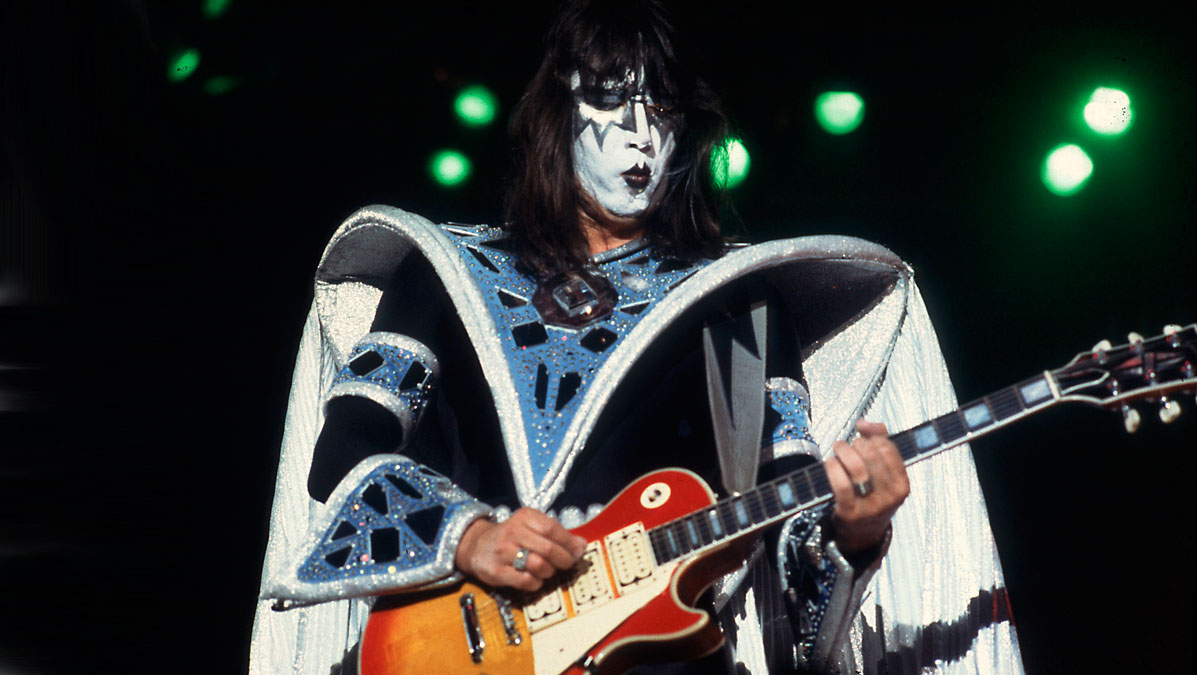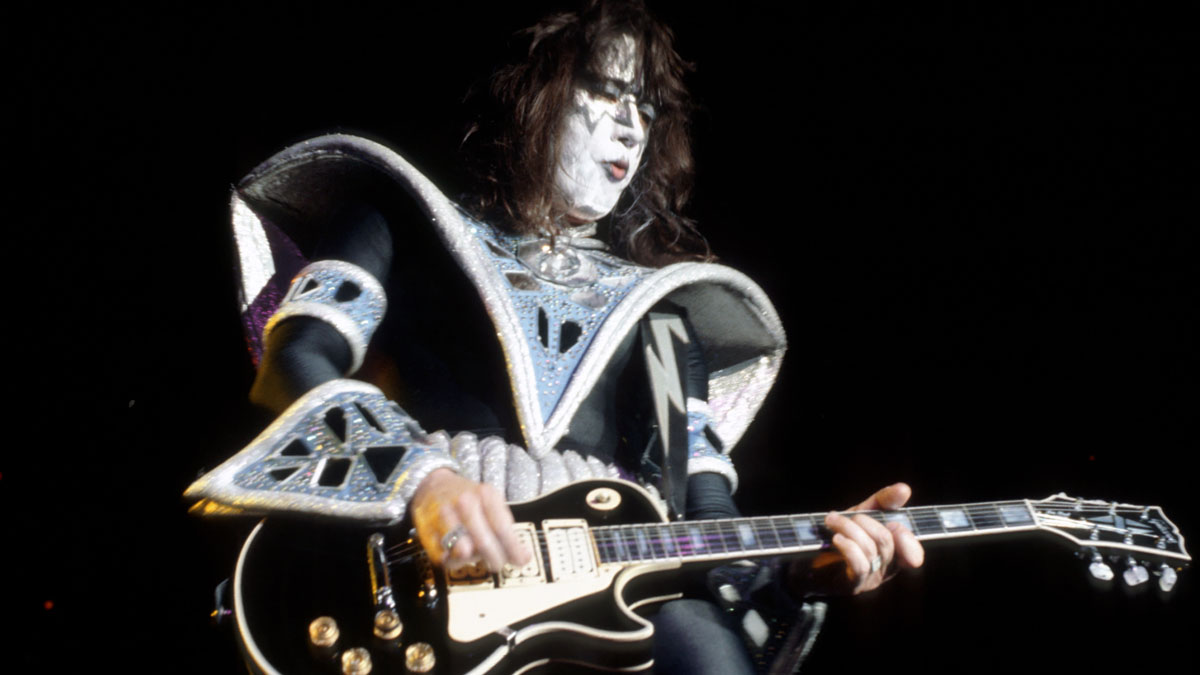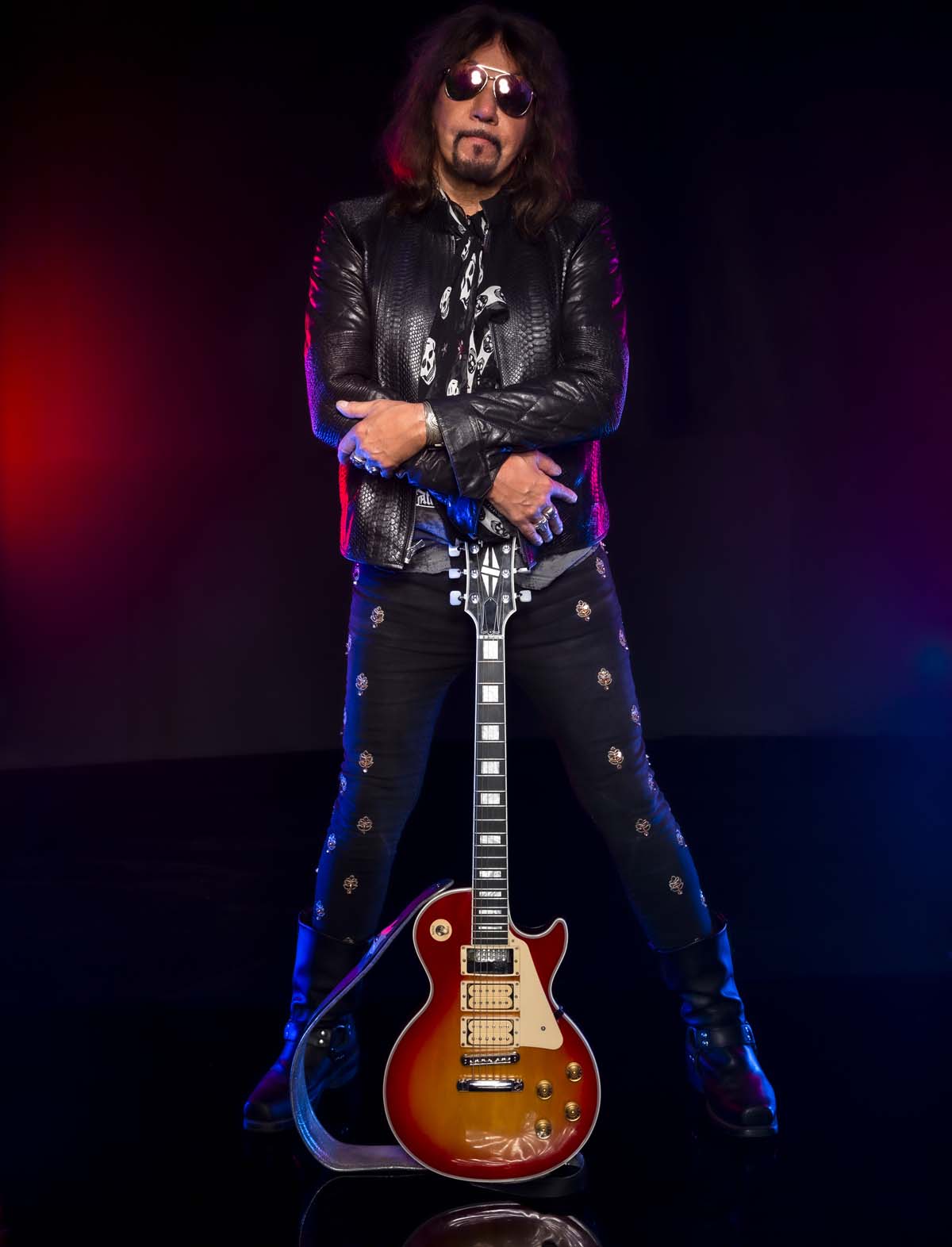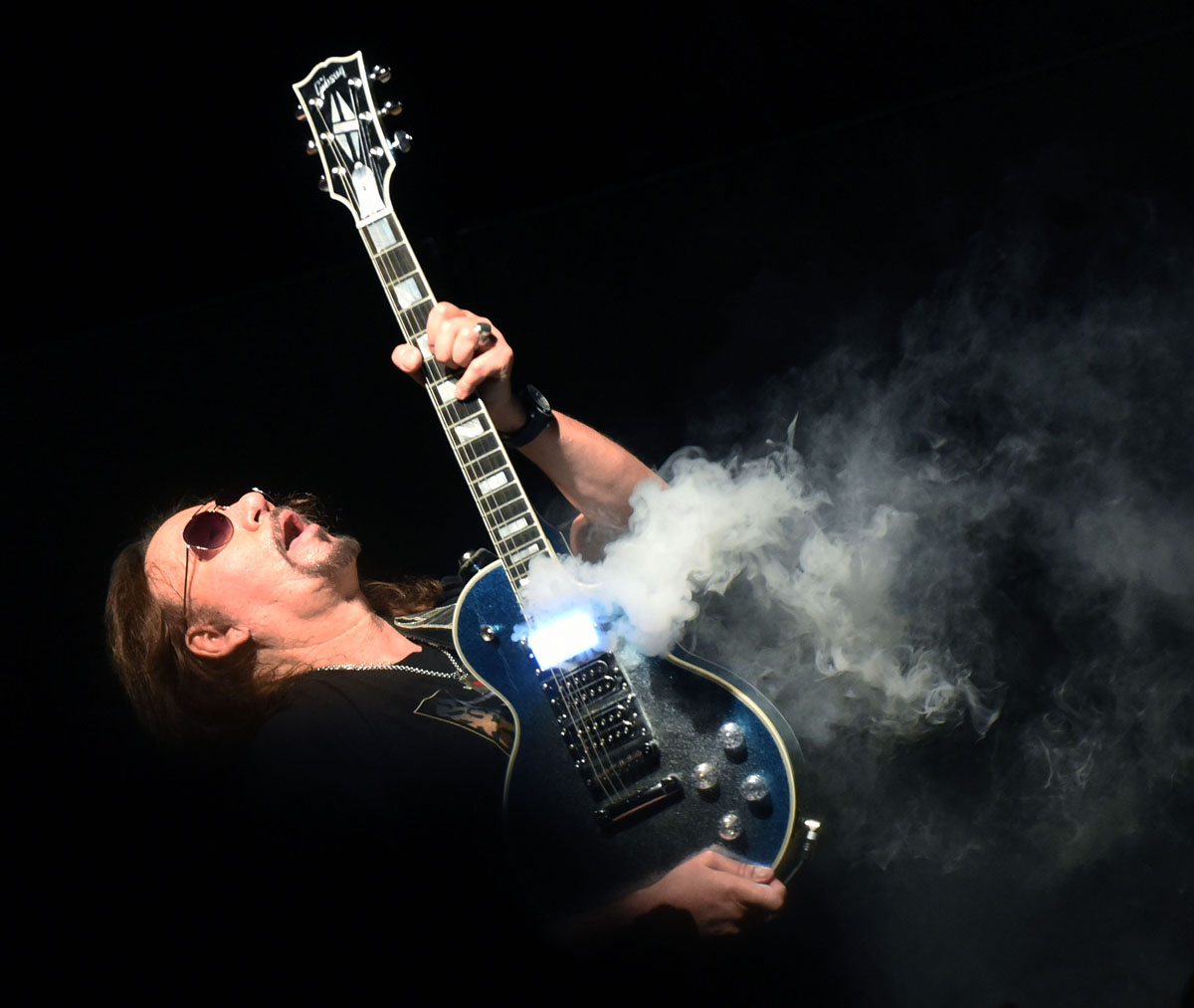Ace Frehley: “I studied Eric Clapton, Jimmy Page, Jeff Beck, Pete Townshend, the Beatles, the Stones... Those guys taught me how to play“
Vibrato? The Washburn AF-40? Torpedo Girl? The Spaceman answers your questions at the Virtual Guitar Show 2020

Want all the hottest music and gear news, reviews, deals, features and more, direct to your inbox? Sign up here.
You are now subscribed
Your newsletter sign-up was successful
The Virtual Guitar Show: Ace Frehley is in a darn good mood when he picks up the phone.
The former KISS guitarist and man of spectacularly-modded electric guitars has just moved back out east, back to New Jersey, and the clean air agrees with him.
“I’m enjoying the seasons now,” he says. “I’m living in the country, surrounded by trees and there’s no fires, no pollution. It’s great. The trees change colour – it’s gorgeous.”
It’s also a Friday, and there is no guitarist who is more Friday Night than Ace Frehley. With KISS, the Spaceman opened a portal into new dimension of rock in which the performances were bigger, the stages more spectacular. The KISS show, Ace Frehley's persona – they weren't of this Earth.
I do my best work without really thinking, just creating. I am not sure if it is coming from my brain or somebody else’s brain, or maybe some alien is helping me out
And the guitars? Well, with Ace you’ve got smoke, lights, and a vibrato that sounds wired to the mains. Like we said, he’s the archetypal Fright Night guitarist.
Frehley's latest release, Origins Vol. 2 album, is a covers album celebrating the brightest stars in the Spaceman’s orbit, performed and recorded with the same energy that's soundtracked innumerable parties.
Turn it up loud and press play, and Frehley's take on Led Zeppelin's Good Times, Bad Times, the Stones' Jumpin' Jack Flash, Deep Purple's Space Truckin' and more will ease you into the weekend.
Want all the hottest music and gear news, reviews, deals, features and more, direct to your inbox? Sign up here.
To inaugurate the Virtual Guitar Show 2020, Frehley strapped himself in his easy chair to answer your questions...

Stacy Garrett Rude asks: What happened to the Washburn lightning bolt signature guitar line?
“I got introduced to people at Washburn, really nice people, and they designed this really cool-looking guitar for me [Washburn AF-40]. Unfortunately, it didn’t sound very good. I started off in KISS playing Les Pauls which, to me, is the best-sounding guitar in the world.
“I played the Washburn a few times live and it just didn’t have the sustain, it didn’t have the output that I wanted, and I ended up putting it aside and going back to Les Pauls.”
I got introduced to people at Washburn, really nice people, and they designed this really cool-looking guitar for me. Unfortunately, it didn’t sound very good
Kevin Riley asks: Does Ace know when Gibson is releasing his Black Beauty Les Paul Custom?
“I’ve been in touch with Gibson and I’ve got three models out right now. This would be the fourth. The next model that Gibson is going to put out is the Black Beauty, which I used in the 70s for the most part. I was in my storage locker. I’ve got seven storage lockers, and I went into one prior to the photo session for Spaceman, and I found that black guitar.
The next model that Gibson is going to put out is the Black Beauty, which I used in the 70s for the most part. It’s coming out. I can’t give you a date, though
“I got that in shape and threw some new strings on it and we did the photo session. Everybody got excited about it. I started using it live for a few shows. Great guitar. I am excited that Gibson is going to put it out.
“Gibson is excited about it. The problem is, Gibson went bankrupt and then they were bought buy a bank, and then they hired new people on the board, so that’s what’s taken so long to put the Black Beauty out, because they had to reorganise the management. But it’s coming out. I can’t give you a date, though.”
Sam Brady asks: Have you been offered any other signature guitars over the years?
“Yeah, but I’m loyal to Gibson because as far as I am concerned the Les Paul is the best. Think about all the great guitar players, and they’ve all played Les Pauls. From Jimmy Page to… Even Keith Richards used to play a Les Paul. Eric Clapton used to play a Les Paul – even though he went with Strats later on in his career.
I’m loyal to Gibson because as far as I am concerned the Les Paul is the best. Think about all the great guitar players, and they’ve all played Les Pauls
“They are just amazing guitars because the angle of the neck is six degrees off the angle of the body, and it creates a tension so that, when you tighten the strings, a Les Paul body will give you more sustain naturally than a Fender. You can lay a Strat or a Tele flat on a table but if you try to lay a Les Paul flat on a table it won’t because the neck is at a six degree angle to the body.”
Christian Pedersen asks: Is it true that most of your solos on the early albums are played with both a Les Paul and a Telecaster mixed together?
“No. Most of the solos are Les Pauls. But when it comes to rhythm guitar tracks, I like to use Les Pauls and Fenders. A Telecaster and a Strat has a different harmonic range to a Les Paul and when you blend them together you get a really thick track.
“I also sometimes used acoustic guitars as well but you really can’t hear them in the mix unless you pull them out. Sometimes I will play a rhythm guitar part on an acoustic – and I’ll hear them but you really won't know it’s there unless you took it away.
When it comes to rhythm guitar tracks, I like to use Les Pauls and Fenders. A Telecaster and a Strat has a different harmonic range to a Les Paul and when you blend them together you get a really thick track
“But it adds something, because every guitar has a slightly different harmonic range, and different harmonics bring out different sounds, and different chords sound differently.”
Dennis Hodges asks: How did you come up with the crazy intro riff to Torpedo Girl? Which, Dennis adds, is “one of the most insanely cool licks I've ever heard.“
“The who?”
Torpedo Girl.
“Oh, Torpedo Girl, yeah!”
Yes! And do you remember how you wrote that?
[Pauses] “Drugs! [Laughs] Drugs and alcohol! Yeah, it is a crazy song. Somebody asked me about that song the other day and I believe, if I am not mistaken, I wrote that bass part first and then I wrote the guitar part to complement the bassline, because they kind of weave in and out of each other. So yeah, that riff, it was a lot of cocaine. [Laughs]”
So yeah, that riff, it was a lot of cocaine
Well that’s the funny thing about you starting it on the bass. Writing is like a conversation – you’ve got the bass and the guitar and sometimes it’s fun to make them talk to each other.
“Yeah, I try to do things as organically and spontaneously as possible. Things just happen. It’s hard for me to explain how they happen. I mean, I don’t even know how I write songs. Sometimes I will write a song musically and then I will need the lyrics.
“And sometimes I feel like someone is beaming the lyrics into my head. I’m not even writing it; someone else is. There is no rhyme or reason why I do or how it turns out, it just happens. It’s hard to put into words.”
When I am doing guitar solos, I try to empty my head, and to not really think. As long as I know what key I’m in, I just hit the record button and let it rip.
“When I am doing guitar solos, I try to empty my head, and to not really think. As long as I know what key I’m in, I just hit the record button and let it rip. I do my best work that way, without really thinking, just creating. I am not sure if it is coming from my brain or somebody else’s brain, or maybe some alien is helping me out. [Laughs] I don’t know.”

Lee Mikel asks: How did you feel about the outfits you wore? Were they comfortable? How did they effect your playing?
“Well, when I was with KISS I had to move around and do choreography and stuff, and sometimes it would affect my playing, sometimes I would make a few mistakes because I was moving around too much, and it is a delicate balance when you are playing live.
Sometimes I’ve just had to stop and focus on what I am playing because, to me, it is more important to get the notes right than to jump around like a nut
“When you are playing in the studio you are sitting down, or standing up, and you don’t have an audience so you can focus 100 per cent on exactly what you are playing.
“But live, you have to put on a show as well. It is a fine balance as to how much you move, because if you do complicated moves, it is going to affect your playing. And not always in the best way! [Laughs]
It was fate that me and Anton Fig got together. We jammed together and hit it off immediately, and became good friends, and great recording buddies. We are still good friends today
“It is a delicate balance. Sometimes I’ve just had to stop and focus on what I am playing because, to me, it is more important to get the notes right than to jump around like a nut. [Laughs]”
Shaun Andrews – among others – asked about how you developed your vibrato?
“Vibrato is something that takes a long time to develop. I’ve watched other guitar players play. I’ve emulated them. I can do vibrato up. I can do it down. I can do it fast. I can do it slow. I’ve really, over the years, learned to control my technique when it comes to vibrato and it is very gratifying.”
Related, and relevant given you've just released an album of covers of players with great vibrato, Roman Forczek asks: In a vibrato battle to the death who would be your most feared opponent?
“Eric Clapton has a great vibrato. So does Jimmy Page. It’s amazing. Y’know, it’s amazing, I have listened to guitar players play and they are playing the right notes, but they don’t have the technique, and they don’t have the vibrato. It sounds stale. It just sounds stagnant.
I have listened to guitar players play and they are playing the right notes but they don’t have the technique and they don’t have the vibrato
“It’s all in the technique and how you play the notes. My father was a concert pianist and he used to tell me, ‘It’s not just learning the notes, it’s the technique.’ And I never forgot that.”
Following Richard's question. Of all the guitar players you’ve covered, whose style is the hardest to master?
“Oh I don’t know, I mean, I was influenced by the whole English invasion and I studied Eric Clapton, Jimmy Page, Jeff Beck, Pete Townshend, the Beatles, the Stones, so those were the guys who taught me how to play guitar. I don’t really have a favourite. They all were indicative of me creating my own style. But you’re talking about what this record?”
Yes, the most difficult to play? Because you’ve got Jimmy Page on there and his phrasing is really unique.
“Oh yeah, Jimmy has his own style, and I know how to play it. I knew how to play the solo on Good Times, Bad Times, because I had been doing Zeppelin songs since I was a teenager, but I actually let my guitarist, Jeremy [Asbrock], do the solo on that song, just so I could give him a chance to get on the record.”
William John Firth asks: What was it like working with Anton Fig?
“Anton Fig is a great drummer, one of my favourite drummers of all time. I met Anton when I was looking for a drummer for my 1974 solo record and it was fate that me and Anton got together.
“A friend of mine who I went to high school with, Larry Russell, recommended him and then, like, a week later my producer, Eddie Kramer, called me up and mentioned the same name, and I thought, ‘Well I guess it is destiny that I get together with this guy.
In a couple of years I am planning – probably – to put out a box-set of unreleased stuff
“I had never heard of Anton Fig before. He was originally from South Africa. We jammed together and hit it off immediately, and became good friends, and great recording buddies. We are still good friends today.”
Bobby Young asks: How much did you learn about music production and engineering from working with Eddie Kramer?
“I learned the most from Eddie Kramer. I remember several recording sessions with Eddie and KISS, when we’d finish the recording session, and Paul, Gene and Peter would leave and I’d stay behind and I’d sit with Eddie for a half-hour or more.
“I would ask him to explain to me what this button does and what this compressor does, and he’d explain the EQ and the compression, and limiters, all sorts of things, and over time, he taught me how to engineer.
“On a lot of my past albums, I have done a lot of the engineering myself. It will help me when I produce other bands, which I would like to do when I get some free time and some young bands into the studio.
“Because I have a wealth of knowledge, of how close to put a microphone to a speaker, and what kind of mic to use. What two mics to blend together to get a better sound. I learned a lot of that stuff from working with great producers.”

Tyson Mielke asks: Talk To Me and Two Sides Of The Coin are in open G tuning. Do you still explore this tuning or other open tunings when you write original songs?
“I haven’t written many songs with open G tuning. I got that from Keith Richards, ‘cos he used that on Brown Sugar and several other tracks. I did used it on Talk To Me, which was a hit in Australia, but I really haven’t written many songs recently with that tuning.
I learned the most from Eddie Kramer. He taught me how to engineer.
“It’s just such a hassle to have to have a guitar tuned especially. Like, if you break a string, then you have to bring an extra guitar on the road, and I’ve already got enough guitars with me ‘cos I’ve got the special FX guitars – the light guitars, the smoke guitar! I try to keep it to a minimum.”
Chris Xynos asks, ‘Do you have any favourite songs that have never made it onto any official releases, and will any of these be released?’
“Well I have a road case filled with about 200 reels of two-inch analogue tape, from when I had my recording studio in Connecticut. And I don’t even know what’s on half of those things.
“It is going to take a long time to get that music off there, because old tape has to be baked and then transferred digitally to hard drives, and so it is a long, tedious process. But in a couple of years I am planning – probably – to put out a box set of unreleased stuff.”
- Ace Frehley's new album, Origins Vol. 2, is out now via eONE / SPV.
- Check out the Virtual Guitar Show 2020 hub for artist interviews and clinics, gear demos and more.